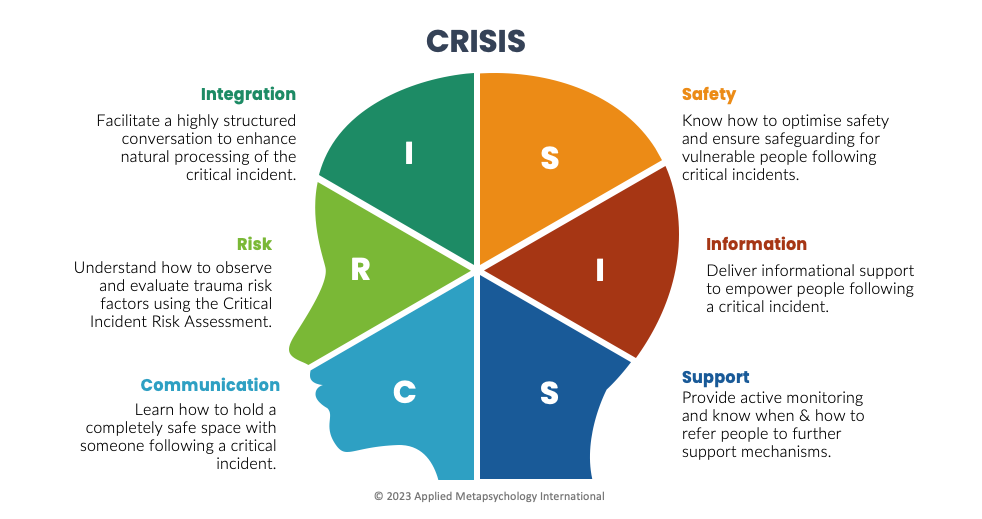What is CRISIS?
Critical Incident Stress Intervention & Support (CRISIS) is an evolutionary development in the field of crisis intervention and psychological first aid.
The foundation of CRISIS is an active process based on six core elements, designed to help people successfully integrate the experience of a critical incident, whilst taking a risk-based approach to the provision of further support.
CRISIS helps people to move from disempowerment to empowerment, from reaction to response, encouraging self-care, and early help-seeking when required. A culturally responsive model, CRISIS is used by Psychologists, Psychotherapists, Counsellors, Practitioners, and Peers on four of the world’s continents, across a broad spectrum of contexts and environments.
CRISIS is consistent with the National Institute for Health and Care Excellence (NICE) guidelines on Post-traumatic Stress Disorder (PTSD), and is accredited by the National Association of Social Workers (NASW) and the Association for Addiction Professionals (NAADAC) for continuing education credits.
Organisational need
CRISIS has been designed to work in any workplace or organisational environment.
Organisations need to fulfil their legal and moral duties regarding the management of stress and trauma, and the risk-based approach of CRISIS helps organisations to have robust assurance when bad things happen.
Here are a few sectors where CRISIS may be particularly useful:
- Voluntary agencies
- Business
- Social work
- Maritime
- Emergency services
- Post terror/disaster recovery
- Community groups
- Clinical services
- Local government
- Air travel
- Criminal justice
- Travel industry
- Manufacture
- Construction
- Education
- Government
- Armed forces
Facilitator training
During this two day training course, CRISIS facilitator’s will learn about:
- The CRISIS Schema®
- Critical incidents
- Dynamic integration
- Subjective criticality
- Communication through crisis
- Critical incident risk assessments
- Integrative learning
- Safety & safeguarding
- Informational support
- Active monitoring
The interactive workshop is delivered by our expert trainers, all of whom have been involved in CRISIS Response operations following the UK’s worst disasters in living memory.
The CRISIS training course can be delivered in-house or online.
Benefits
Adopting CRISIS into your organisation’s mental health strategy brings many benefits.
For example, implementing CRISIS within your organisation may:
- Provide legal duty of care
- Demonstrate moral responsibility
- Support the general wellbeing of your people
- Reduce financial loss through presenteeism and absenteeism
- Create a trauma-informed approach to mental health
- Update your current provision
- Upskill existing practitioners within your organisation
- Build organisational endurance and resilience
Implementing CRISIS
Implementing CRISIS within your organisation couldn’t be easier.
We’re here to help you:
- Select and train your CRISIS facilitators
- Supervise your CRISIS coordinators and facilitators
- Design and embed your CRISIS policies and procedures
- Communicate the implementation of your CRISIS strategy
- Monitor and review your implementation of CRISIS
- Provide ongoing refresher and development training
- Support your mental health strategies



